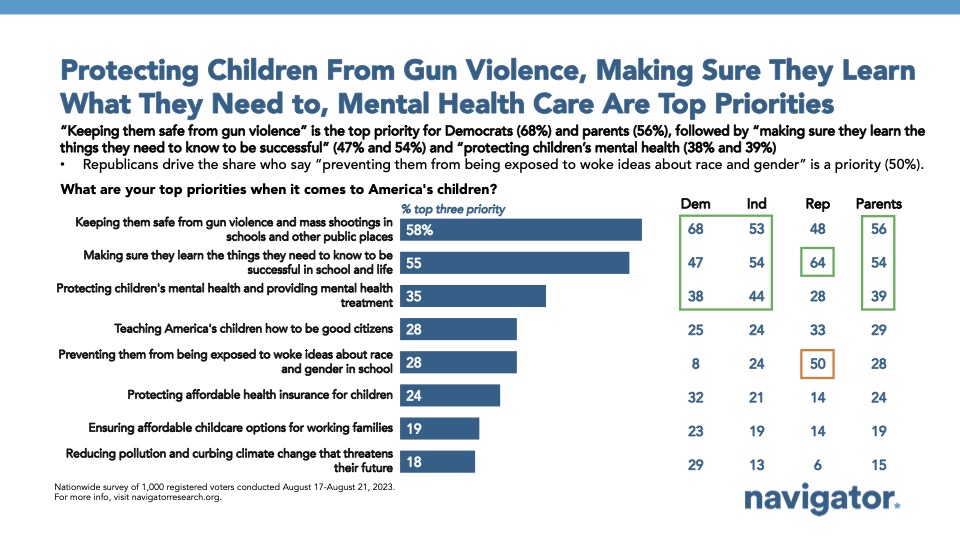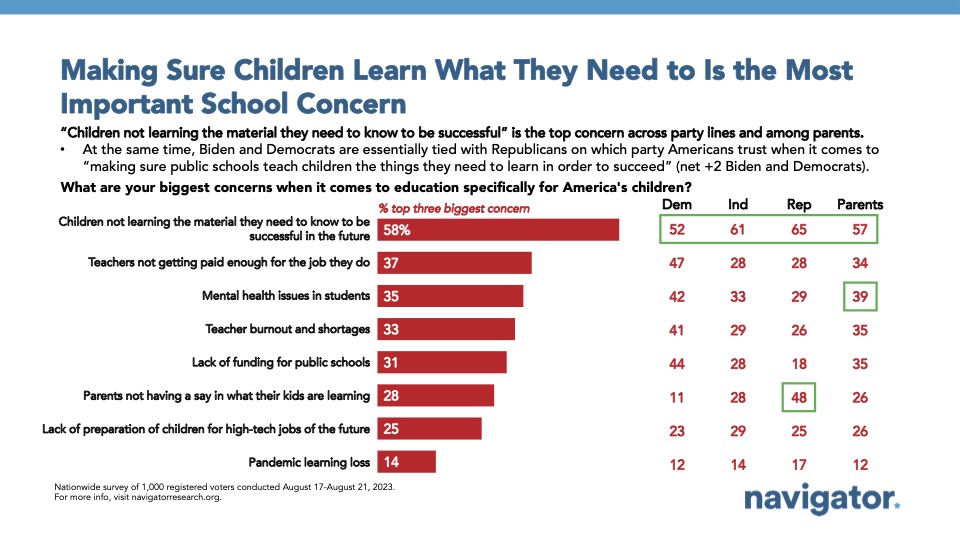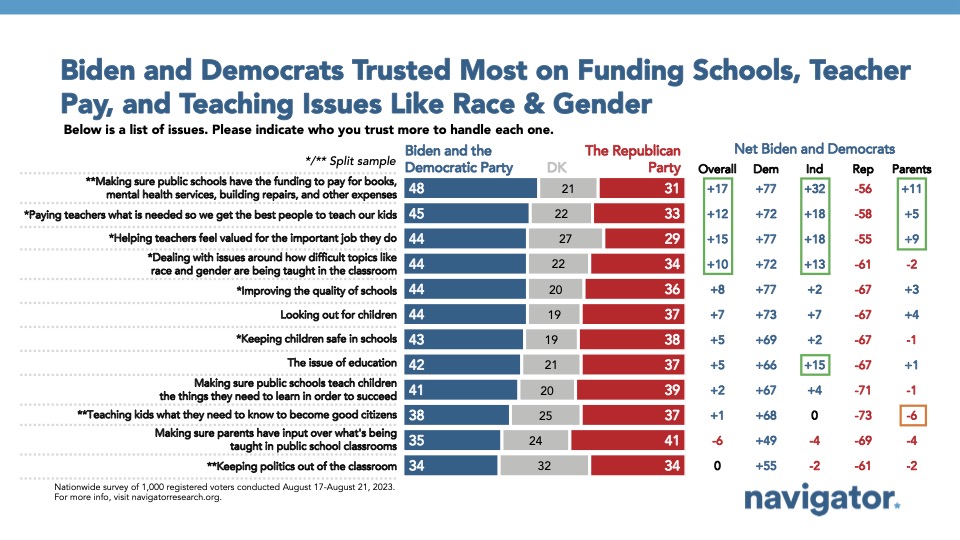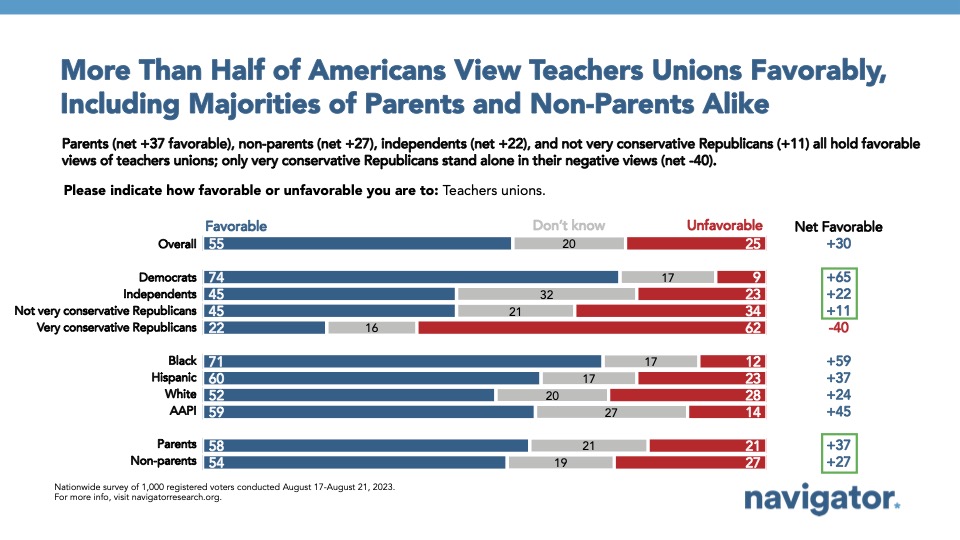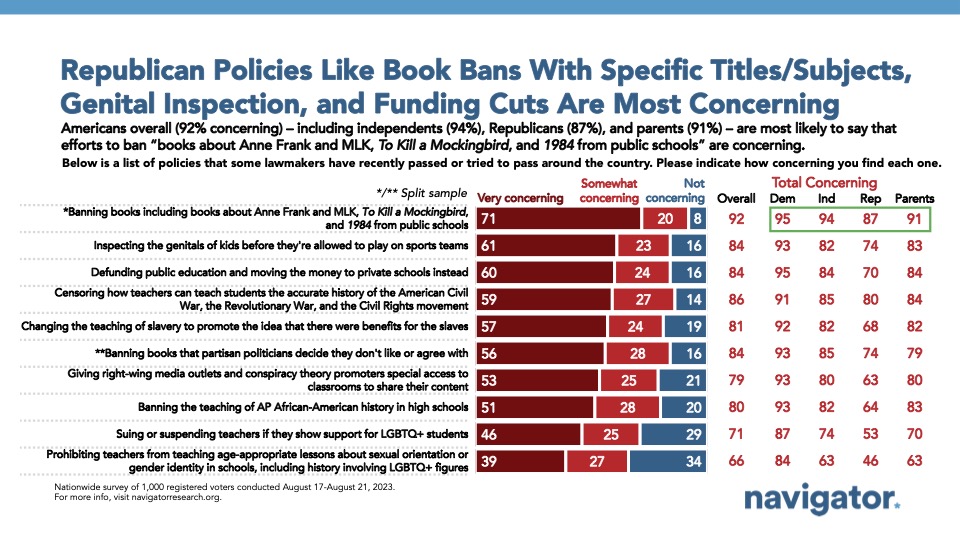Americans’ Educational Priorities Focus on Keeping Students Safe and Ensuring They Are Prepared
This Navigator Research report contains polling data on Americans’ latest perceptions on education policy in the United States, including which party Americans trust more to handle different aspects of education policy, what Americans view as the most important priorities when it comes to education, and which recently-enacted or proposed policies in schools Americans find to be most concerning.
As students return to schools this fall, Americans want schools to prioritize keeping kids safe and making sure students learn what they need to in order to succeed.
Among a list of priorities when it comes to America’s children, the majority identify two top priorities: “keeping them safe from gun violence and mass shootings in schools and other public places” (58 percent) and “making sure they learn the things they need to know to be successful in school and life” (55 percent). Seven in ten Democrats (68 percent), a majority of independents (53 percent), and nearly half of Republicans (48 percent) prioritize safety from gun violence, and making sure students learn what they need to succeed also transcends partisanship, including two in three Republicans (64 percent), a majority of independents (54 percent), and nearly half of Democrats (47 percent). Parents are also most likely to prioritize keeping children safe from gun violence (56 percent) and making sure they learn the things they need to be most successful in school and life (54 percent).
- “Preventing them from being exposed to woke ideas about race and gender in school” ranks lower as a priority (28 percent), largely driven by Republicans who say it is the second highest priority (50 percent) compared to just 24 percent of independents and 8 percent of Democrats saying the same. 28 percent of parents say preventing exposure to woke ideas is a priority, though it is higher among dads (34 percent) than moms (25 percent).
- Of a list of the top concerns Americans have when it comes to education for America’s children, by far the top priority is “children not learning the material they need to know to be successful in the future” (58 percent), 5 points higher than in February and 7 points higher among parents (from 50 percent in February to 57 percent now). Other concerns are distant in comparison – ranking at least 20 points lower – including that “teachers not getting paid enough for the job they do” (37 percent), “mental health issues in students” (35 percent), and “teacher burnout and shortages” (33 percent).
Americans trust President Biden and the Democratic Party to handle issues related to education over the Republican Party, including funding schools, valuing teachers, and looking out for children.
Democrats hold double-digit advantages over Republicans on “making sure public schools have the funding to pay for books, mental health services, building repairs, and other expenses” (net +17; 48 percent Biden/Democrats – 31 percent Republicans), “paying teachers what is needed so we get the best people to teach our kids” (net +12; 45 percent Biden/Democrats – 33 percent Republicans), “helping teachers feel valued for the important job they do” (net +15; 44 percent Biden/Democrats – 29 percent Republicans), and “dealing with issues around how difficult topics like race and gender are being taught in the classroom” (net +10; 44 percent Biden/Democrats – 34 percent Republicans). Biden and Democrats also hold narrower advantages on “improving the quality of schools” (net +8; 44 percent Biden/Democrats – 36 percent Republicans), “looking out for children” (net +7; 44 percent Biden/Democrats – 37 percent Republicans), and the “the issue of education” generally (net +5; 42 percent Biden/Democrats – 37 percent Republicans). Across all these metrics, there is between 15 percent and 20 percent that remain unsure which party they trust more.
- Neither party has a clear advantage on the issue of “making sure public schools teach children the things they need in order to succeed” (41 percent Biden/Democrats – 39 percent Republicans), despite this being the top priority Americans have for education.
The public has a highly favorable opinion of teachers unions.
By a 30-point margin, most Americans have a favorable view of teachers unions (55 percent favorable – 25 percent unfavorable), including three in four Democrats (net +65; 74 percent favorable – 9 percent unfavorable) and pluralities of both independents (net +22; 45 percent favorable – 23 percent unfavorable) and Republicans who do not identify as being very conservative (net +11; 45 percent favorable – 34 percent unfavorable).
- The only group by partisanship and ideology who are net unfavorable toward teachers unions are Republicans who identify as being very conservative (net -40; 22 percent favorable – 62 percent unfavorable).
- These findings are consistent with our dial group last week in Milwaukee of the first Republican presidential primary debate: Chris Christie and Tim Scott both made comments critical of teachers unions that may have been aimed at the Republican primary electorate, but which were negatively rated by independents watching the debate.
The most concerning education-related policies that have recently been enacted or proposed include banning books, defunding public education, and censoring how teachers can teach students accurate history.
Among a list of policies that some lawmakers have recently passed or tried to pass around the country, some of the most concerning include “banning books including books about Anne Frank and MLK, To Kill a Mockingbird, and 1984 from public schools” (92 percent find this concerning, including 91 percent of parents), “censoring how teachers can teach students the accurate history of the American Civil War, the Revolutionary War, and the Civil Rights movement” (86 percent find this concerning, including 84 percent of parents), and “defunding public education and moving the money to private schools instead” (84 percent find this concerning, including 84 percent of parents). At least three in four Americans also find the following proposed or recently-enacted policies concerning:
- Inspecting the genitals of kids before they’re allowed to play on sports teams (84 percent find this concerning, including 61 percent who find it “very” concerning);
- Banning books that partisan politicians decide they don’t like or agree with (84 percent find this concerning, including 56 percent who find it “very” concerning); and,
- Changing the teaching of slavery to promote the idea that there were benefits for the slaves (81 percent find this concerning, including 57 percent who find it “very” concerning).
Read More
About The Study
August 17-August 21, 2023. 105 additional interviews were conducted among Hispanic voters. 75 additional
interviews were conducted among Asian American and Pacific Islander voters. 103 additional interviews were
conducted among African American voters. 100 additional interviews were conducted among independent
voters. 100 additional interviews were conducted among union households. The survey was conducted online,
recruiting respondents from an opt-in online panel vendor. Respondents were verified against a voter file and
special care was taken to ensure the demographic composition of our sample matched that of the national
registered voter population across a variety of demographic variables.

